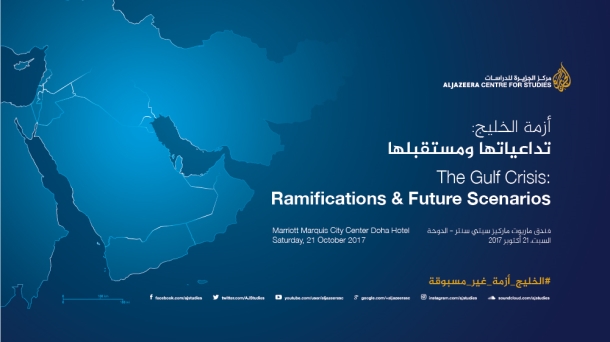
The Gulf Crisis: Ramifications & Future Scenarios
Doha - Saturday, 21 October 2017
Al Jazeera Centre for Studies is organising a conference under the title, “The Gulf Crisis: Ramifications & Future Scenarios”, on Saturday, 21 October 2017, at the Marriot Marquis City Centre Doha Hotel.
The conference will address the Gulf crisis in light of the GCC countries’ historical relations. It will also investigate the reactions of regional and international players, and shed light on crisis management at the political, diplomatic, economic and media levels. In addition, it aims to explore the repercussions and possible scenarios.
A group of politicians, experts and professionals from various countries will participate in the conference over the course of three sessions, staring at 10:00 am.
Conference Programme
|
Time |
Session |
|
9:30 – 10:00 |
Registration |
|
10:00 – 12:00 |
Session One: The current situation in light of historical GCC relations
GCC relations have faced numerous crises in the past where internal, regional and international dynamics including timing, the parties involved, strategies, goals and manner of settlement have played instrumental roles. As a result, each crisis was unique; and in order to recognise the dynamics of the most recent one, its features should be examined.
Moderator:
Speakers:
|
|
12:00 – 12:30 |
Coffee Break |
|
12:30 – 14:30 |
Session Two: The repercussions and management of the Gulf crisis
In light of the rapid developments over the last five months, the Gulf crisis has proven to have grave social, economic, political and strategic ramifications on the local, regional and international levels. Kuwait’s mediatory efforts, backed by regional and international players, aimed to find swift solution to lessen the impact of these ramifications. Although these efforts succeeded in averting a military standoff, they have not found the desired solution.
Moderator:
Speakers:
|
|
14:30 – 15:30 |
Lunch Break |
|
15:30 -17:00 |
Session Three: Prospective scenarios and the way forward
The Gulf crisis has had grave direct and indirect domestic consequences for all the parties involved. It has also caused a ripple effect across the entire region, with wider impacts at the international levels.
Moderator:
Speakers:
|
|
17:00 – 17:15 |
Signing a Book, Contest of the Gulf Crisis and its repercussions. Ezzedine Abdelmoula - Haoues Taguia and other authors. |